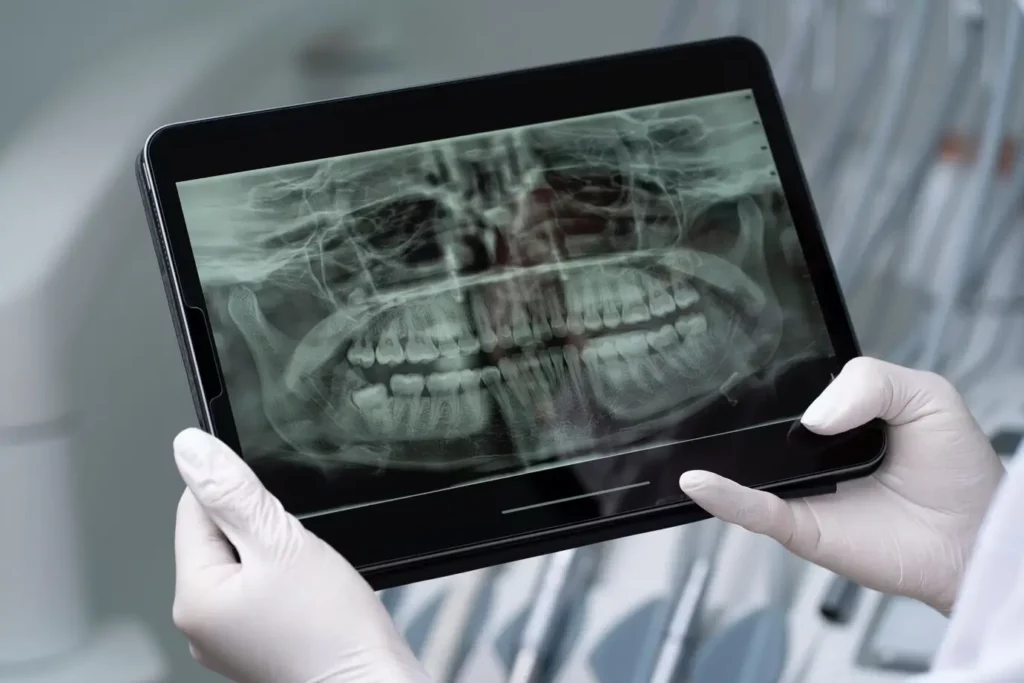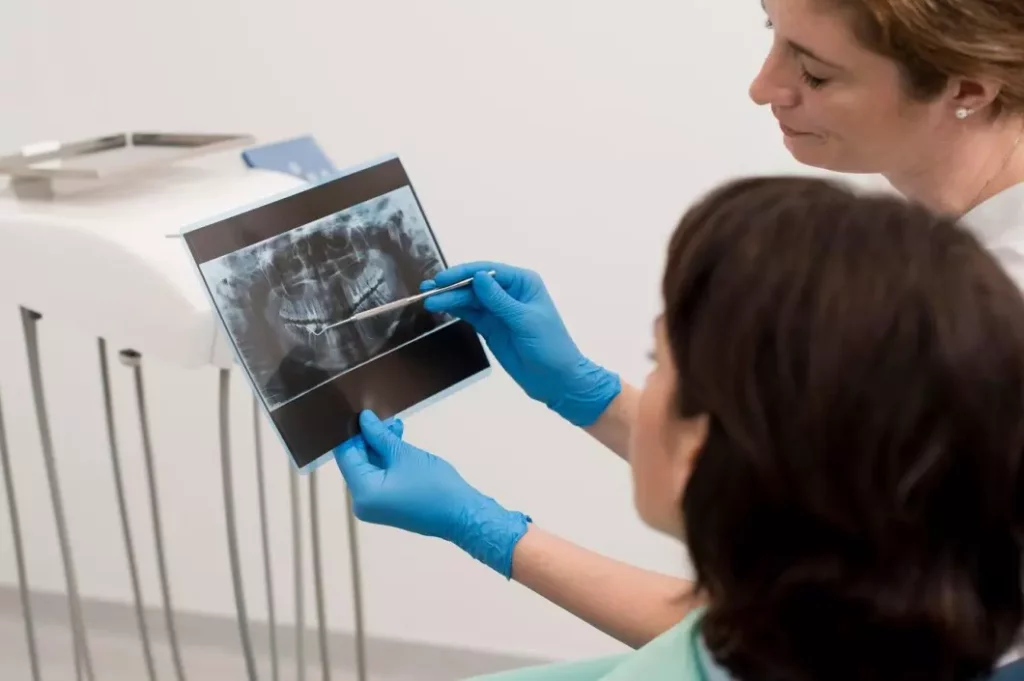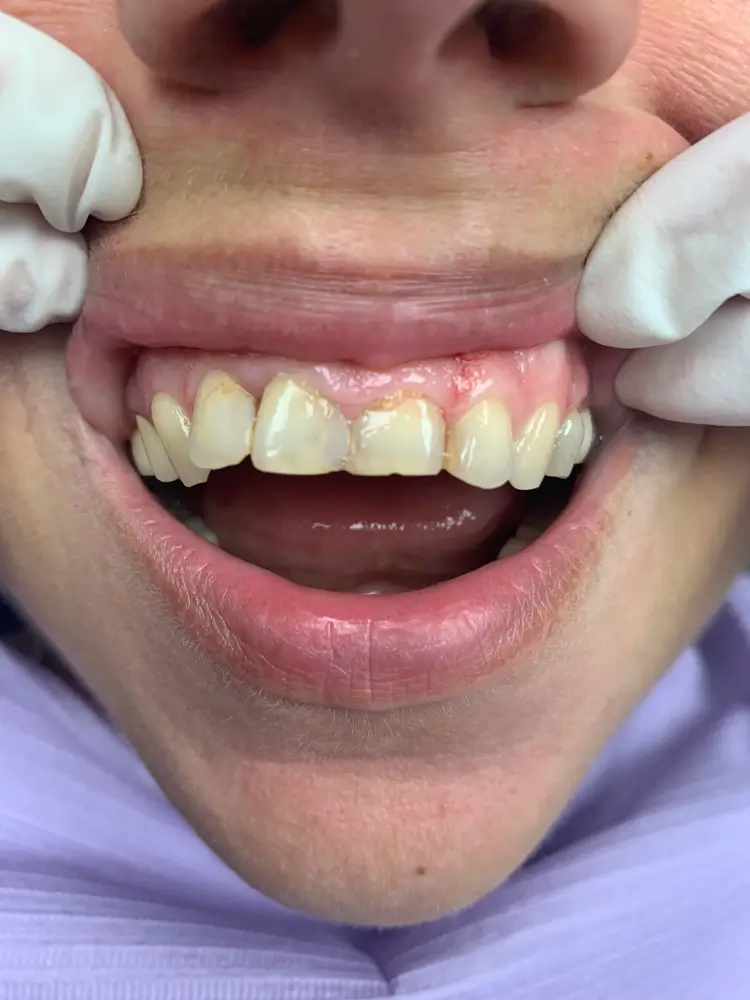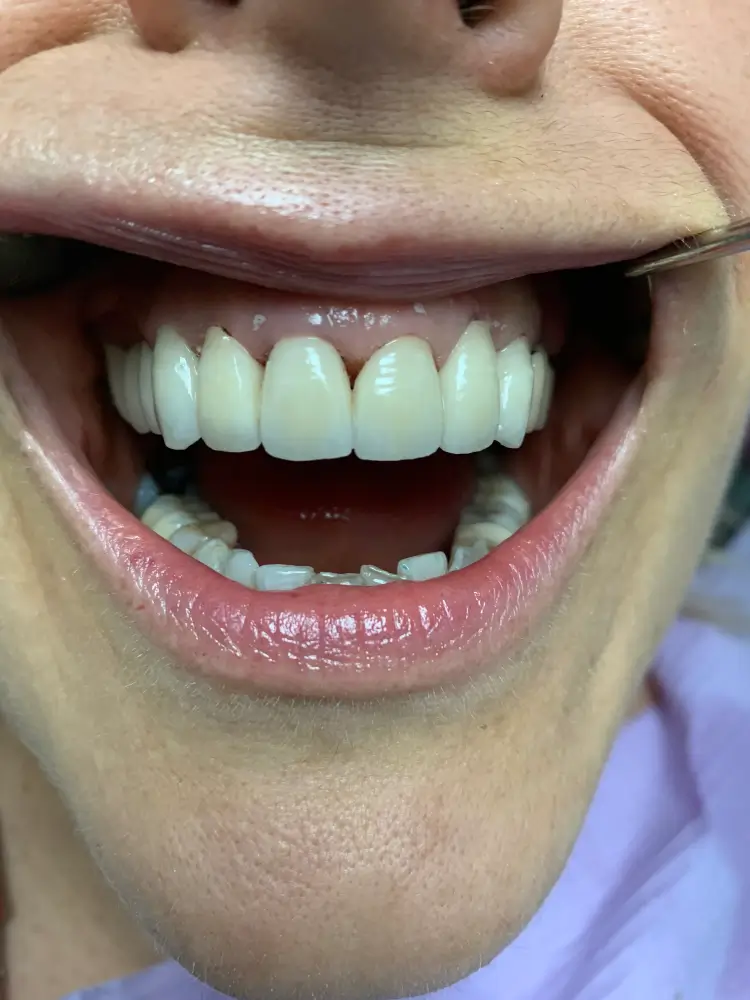
Clifton Dentist - Root Canal
Need a consult?

Information
Root canal therapy, also known as endodontic treatment, is a dental procedure designed to treat and save a severely damaged or infected tooth. The procedure involves removing the infected pulp from the tooth’s root canal, cleaning and disinfecting the canal, and then sealing it to prevent further infection. Root canal therapy is typically performed by an endodontist, a dental specialist who focuses on treating issues related to the tooth’s inner pulp and root.
The inner pulp of a tooth contains nerves, blood vessels, and connective tissues. When the pulp becomes infected or inflamed, it can cause severe pain, sensitivity, and potential tooth loss if left untreated. Root canal therapy aims to alleviate pain, eliminate infection, and save the natural tooth, avoiding the need for extraction.
Our experienced team of dental specialists understands the importance of preserving your natural teeth and relieving you from the pain caused by infected or damaged tooth pulp. At Dr.Edward Doktorman, we prioritize patient comfort, effective treatment, and long-term dental care. Trust us for exceptional root canal treatment in Clifton, NJ.
Doctor
Dr. Doktorman offers full range of services in the scope of general dentistry, such as cosmetic composite fillings, root canals, removable dentures of multiple designs, crown and bridges, surgical services and gum treatment. Dr. Doktorman completed implant residency in NYU. All phases of implant dentistry are performed in our office. We offer implant placement, variety of implant supported restorations both fixed and removable. Our office offers a FREE consultation for the patients interested in implant placement and restorations.

Testimonials
Trustindex verifies that the original source of the review is Google. I have been to many dentists throughout the years, mainly because as a kid too young adult, I did not take good care of my teeth, so now im paying the price. This is by far the best dentist i have ever been to, he redid the work of a bad crown from another dentist and also did an implant for me, during the entire process of both procedures during different time frames he made me feel comfortable and took his time with me, answering all my questions. It's refreshing to have a dentist who doesn't rush from door to door, taking in multiple patients at once. After the implant tooth was put in, if I needed more adjustments, he let me know to call, and he will make time to get it adjusted for me. Also, so far, appointments have been very spot on, at most 5 - 10 min wait, but sometimes I get in even earlier. This is my main dentist now for all work going forward.Trustindex verifies that the original source of the review is Google. I’ve been a regular patient of Dr. Doctorman for over a decade, and I can confidently say he’s an exceptional dentist. His expertise and attention to detail have resolved all my dental issues, and his commitment to thorough, personalized care is unmatched. I consistently receive top-notch treatment during my regular checkups, and his friendly demeanor makes each visit pleasant. Dr. Doctorman is the ultimate professional in his field, and I highly recommend him to anyone seeking reliable and effective dental care.Trustindex verifies that the original source of the review is Google. Excellent service, always patient with me to ease my nerves during any process and kind staff. Highly recommend!Trustindex verifies that the original source of the review is Google. I’ve been going to Dr. Doktorman for a few years now, and he’s been great. He’s really good at what he does and always makes sure I understand what’s going on with my teeth. I used to feel a little nervous about going to the dentist, but he’s so calm and friendly that it’s not a big deal anymore. The office is nice and clean, and the staff is always polite and helpful. I highly recommend Dr. Doktorman if you’re looking for a dentist who’s professional and easy to talk to. He’s been a great dentist, and I’m extremely happy with the care that I’ve received.Trustindex verifies that the original source of the review is Google. Dr Doktorman has been my dentist for nearly 10 years. He is always very courteous and professional. I always recommend him to friends and family.Trustindex verifies that the original source of the review is Google. I have been Dr. Dokterman's patient for years and will continue to be. From typical cavity fillings to root canals his work is top notch. He and his staff are also welcoming and professional.Trustindex verifies that the original source of the review is Google. Dr. Doktorman has great customer service and he and his dental staff do wonderful dental work!Trustindex verifies that the original source of the review is Google. Excellent clinic. I am a patient of Doctorman for the last five years, his very profesional and a good doctor. Staf its very helpful and friendly I would recommend Prestige dental to all my friends and family.Trustindex verifies that the original source of the review is Google. I was referred by a good friend. I Never have to wait later than my appointment time. The office is very clean and the staff is amazing. Dr. Doktorman is very informative and knowledgeable, he explains everything in details. I can’t wait to go to my next cleaning.Trustindex verifies that the original source of the review is Google. I can't say enough great things about Dr. Doktorman! He is incredibly caring and truly goes above and beyond for his patients. I always appreciate how he follows up after appointments to ensure everything is going well—it's clear he genuinely cares about his work and his patients' well-being. He is honest, trustworthy, and takes the time to listen to my concerns, making me feel heard and valued as a patient. I trust him wholeheartedly, not just with my care but with my entire family's as well.
Information

When tooth decay reaches the inner pulp, it can cause infection and inflammation, leading to the need for root canal treatment.
Physical trauma to the tooth, such as a severe blow or injury, can damage the pulp and necessitate root canal therapy.
A tooth fracture or crack can expose the pulp to bacteria, leading to infection and requiring root canal treatment.
Teeth that have undergone multiple dental procedures, such as fillings or crowns, may develop complications or infection in the pulp, necessitating root canal therapy.
An abscessed tooth, characterized by a pus-filled pocket near the tooth root, often requires root canal treatment to eliminate the infection and prevent its spread.
Advanced gum disease can cause the gums to recede, exposing the tooth roots to bacteria and potential infection, requiring root canal therapy.
If you experience persistent tooth pain, sensitivity, or suspect an infection, it is crucial to consult with the dentist promptly. They will evaluate your condition and recommend root canal treatment if necessary, helping you restore your oral health and alleviate discomfort. Early intervention is key to a successful outcome in root canal therapy.
Information
Root canal therapy is primarily performed to alleviate severe tooth pain caused by infection or inflammation of the tooth’s pulp. By removing the infected pulp and eliminating the source of pain, root canal treatment provides significant relief.
Root canal therapy effectively eliminates the infection within the tooth, preventing it from spreading to the surrounding tissues or causing further complications. This helps preserve the overall oral health and prevents the need for more invasive and extensive treatments.
Saving the natural tooth through root canal therapy is crucial for maintaining proper oral function and aesthetics. Losing a tooth can lead to difficulties in chewing, speaking, and may impact the alignment of neighboring teeth. Root canal treatment allows you to keep your natural smile intact.
Root canal therapy is often a preferable alternative to tooth extraction. Keeping the natural tooth through root canal treatment avoids the need for replacing the missing tooth with a dental implant, bridge, or removable denture.

Information


Information
Root canal problems can manifest through various signs and symptoms, indicating the need for prompt dental intervention. Recognizing these indicators can help you seek timely treatment and potentially save your tooth from further damage. Here are some common signs and symptoms of root canal problems:
One of the primary indications of a root canal problem is persistent tooth pain. The pain may range from a mild ache to severe, throbbing discomfort. The pain is often continuous and may worsen when you bite down or apply pressure to the affected tooth. If you experience persistent tooth pain, it is essential to seek dental attention as it could be a sign of infected or inflamed tooth pulp.
Another common symptom of root canal problems is sensitivity to hot and cold temperatures. If you experience sharp or lingering pain when consuming hot or cold foods or beverages, it may indicate an issue with the tooth’s pulp. Normal teeth may experience temporary sensitivity, but if the sensitivity persists or worsens over time, it’s advisable to consult with our dentist for further evaluation.
Root canal problems can lead to gum swelling and tenderness around the affected tooth. The gum tissue may appear red, swollen, or even develop a small pimple-like bump called a gum boil or abscess. This swelling occurs as a result of infection or inflammation spreading from the tooth’s root to the surrounding gum tissues. If you notice gum swelling or tenderness, it is important to seek dental care immediately.
A tooth that undergoes root canal problems may exhibit visible changes in color. The affected tooth may darken or become discolored compared to the adjacent teeth. This discoloration occurs due to the breakdown of the internal structures of the tooth, such as the pulp or blood vessels. If you notice darkening or discoloration of a tooth, it is a sign that the tooth’s health may be compromised and requires professional evaluation.
Root canal problems can cause increased sensitivity when biting or applying pressure to the affected tooth. You may feel discomfort or pain when chewing or biting down on certain foods or when pressure is applied during dental hygiene routines. If you experience prolonged sensitivity to pressure or biting, it could be an indication that the tooth’s pulp is compromised, requiring attention from a dental professional.
It’s important to note that while these signs and symptoms may suggest root canal problems, a definitive diagnosis can only be made by a dental professional through a thorough examination and appropriate diagnostic tests. If you experience any of these symptoms, it is essential to consult with the Dr. Edward Doktorman team as soon as possible for an accurate diagnosis and appropriate treatment to prevent further complications.
Early intervention is key to saving the tooth and ensuring optimal oral health. By recognizing these signs and seeking timely dental care, you can address root canal problems effectively and restore the health and function of your tooth.
The root canal procedure, also known as endodontic treatment, is a dental procedure performed to treat and save a tooth that has been severely damaged or infected. The procedure involves several steps aimed at removing the infected pulp, cleaning and disinfecting the root canal, and restoring the tooth to its natural function. Let’s explore each stage of the root canal procedure in detail:
Throughout the root canal procedure, we will ensure your comfort and communicate with you to ensure you are at ease. We will also provide post-operative instructions to help you recover effectively and maintain the longevity of the treated tooth.
It’s important to note that the root canal procedure may require multiple visits, depending on the complexity of the case and the presence of any associated infections. Our team will evaluate your specific situation and provide a treatment plan tailored to your needs.
Root canal treatment, also known as endodontic therapy, offers several benefits that go beyond pain relief. It is a highly effective procedure aimed at saving an infected or damaged tooth, preserving its natural structure, and restoring its function. Let’s explore the key benefits of root canal treatment:
One of the primary benefits of root canal treatment is pain relief. Root canal problems are often accompanied by severe toothaches and sensitivity. By removing the infected or inflamed pulp, the source of pain is eliminated, providing immediate relief. Additionally, root canal treatment removes the infection, preventing it from spreading to neighboring teeth or causing further complications.
Preserving your natural tooth is always the best option when possible, and root canal treatment allows for just that. During the procedure, the infected pulp is removed, while the rest of the tooth remains intact. This helps maintain the natural appearance, strength, and function of the tooth. Preserving the natural tooth also eliminates the need for more extensive dental work, such as dental implants or bridges, which may be required if the tooth is extracted.
Root canal treatment restores the chewing function of the affected tooth. A tooth that is infected or damaged can make eating certain foods difficult and uncomfortable. By eliminating the infection and restoring the tooth’s structure, root canal therapy allows you to bite and chew comfortably, improving your overall oral function.
Root canal treatment can also provide aesthetically pleasing results. After the root canal procedure, a dental crown is often placed on the treated tooth. This crown not only strengthens the tooth but also enhances its appearance. Dental crowns are custom-made to match the color, shape, and size of your natural teeth, ensuring a seamless and natural-looking result. With a restored tooth, you can confidently smile and interact with others without any self-consciousness.
Root canal treatment is a cost-effective dental solution in the long run. While the upfront cost may be higher than simple extractions, it is a more affordable alternative to tooth replacement options like dental implants or bridges. By preserving your natural tooth, you avoid the need for additional dental procedures and the associated expenses in the future.
It’s important to note that after root canal treatment, proper oral hygiene practices, regular dental check-ups, and good dental care habits are essential to maintain the longevity of the treated tooth and overall oral health.
At Dr. Edward Doktorman in Clifton, NJ, we are dedicated to delivering top-notch root canal treatment that aims to alleviate pain, eliminate infection, and preserve your natural teeth. Our skilled team of dental specialists utilizes advanced techniques and technology to ensure a comfortable and efficient root canal procedure. We understand the importance of saving your natural teeth and restoring your oral health, enabling you to chew, speak, and smile with confidence. With a focus on patient satisfaction, we strive to provide personalized care and comprehensive dental solutions, including emergency dentistry services. Visit Dr. Edward Doktorman for exceptional root canal treatment in Clifton, NJ, and experience the highest standard of dental care.
After undergoing a root canal treatment at Dr. Doktorman’s office, it’s essential to follow these care guidelines to ensure optimal healing and the long-term success of your treatment:
By following these guidelines, you can support the healing process and maintain the health of your tooth after a root canal. If you have any questions or need further assistance, please don’t hesitate to reach out to us.
Before undergoing a root canal, it’s crucial to discuss your medical history with your dentist, as certain health conditions or medications can affect the success of the procedure. Make sure to inform your dentist about any allergies or sensitivities you may have, as well as any concerns regarding the materials used during the treatment.
Follow all post-procedure care instructions carefully to avoid complications and to ensure the longevity of the root canal. If you experience any unusual pain, swelling, or other issues after the procedure, contact your dentist promptly. Regular follow-up visits are essential to monitor the health of the treated tooth and your overall oral health.
Dr. Doktorman’s office is in-network with many major insurance providers to help make your root canal treatment more accessible. We work with top insurance companies, including:
We also collaborate with various other insurance plans. If you have any questions about your coverage or need assistance with understanding your benefits for root canal treatment, our team is here to help.
At Dr. Doktorman’s office in Clifton, NJ, we are dedicated to providing high-quality root canal treatment with transparent pricing. While the cost of a root canal can vary based on several factors, we are committed to making your treatment affordable and accessible.
Factors Affecting Cost The cost of a root canal may depend on the complexity of the procedure, the location and condition of the affected tooth, and whether additional treatments, such as a post or crown, are needed. Our team will provide you with a clear estimate and a comprehensive explanation of the costs involved before beginning your treatment.
Insurance and Payment Options We accept a wide range of insurance plans and work with various providers to help you make the most of your benefits. Additionally, we offer flexible payment options to accommodate different budgets and financial situations.
Personalized Assistance If you have any questions about the cost of your root canal or need help understanding your insurance coverage, our team is here to assist you. We are committed to ensuring that you receive the necessary care without any financial surprises.
For more information or to discuss your specific needs, please contact us. We look forward to providing you with exceptional care and support throughout your root canal treatment.
Dr. Edward Doktorman, DDS, has been consistently recognized by the Consumers’ Research Council of America for his excellence in family, cosmetic, implantology, and general dentistry, earning multiple “America’s Top Dentists” awards from 2014 to 2017.
List of Certificates:
A root canal treatment typically requires one to two visits to complete, with each session lasting between 30 minutes to two hours. The duration depends on the complexity of the condition and the tooth being treated. Molars are often more complex due to having more canals, which might require additional time.
After a root canal, a tooth can remain structurally weakened and more susceptible to fracture. While there’s no set timeframe for how long a root canal treated tooth can last without a crown, it’s generally advised to have a crown placed soon after the procedure to protect the tooth, restore its function, and prevent it from breaking. Without a crown, the tooth is at a higher risk for fracture, which could lead to the tooth needing to be extracted. The timing for getting a crown varies, but many dentists recommend doing so within a few weeks of the root canal treatment.
Root canal treatments are generally not painful, thanks to modern anesthesia and dental techniques. Most patients report that the procedure itself feels similar to having a filling placed, with little to no discomfort. Following the treatment, some tenderness or mild discomfort might be experienced for a few days, which can usually be managed with over-the-counter pain relievers.
Need a consult?